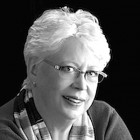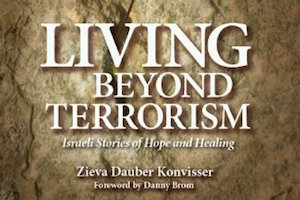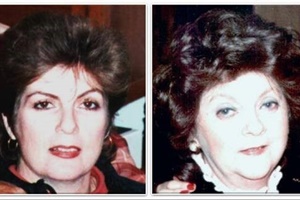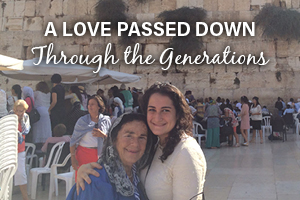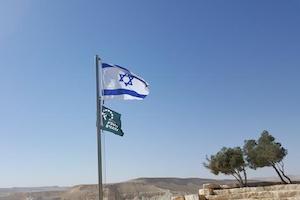We Will Return Home Soon
This essay was originally published in The Journal of Jewish Historical Society of Michigan (Volume 59/60, Summer 2020) here and was republished in honor of Aliyah Day on 7 Heshvan.
“I promise our move to America will be temporary and we will return home soon,” my father told his bride a few months after their wedding in Jerusalem, as the Germans under Rommel were advancing through Egypt and all Americans in the Middle East were advised to return to America. It was 1941. They were 23 and 22 years old.
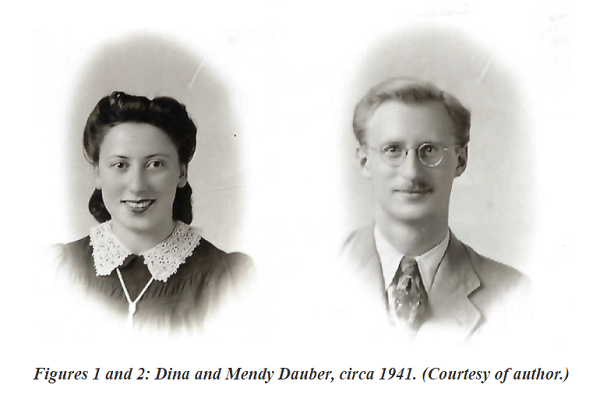
This promise to make Aliyah and move back to Israel was woven into the fabric of our every-day family life in Passaic and Clifton, New Jersey, and into our family lore for the next 32 years—so much that in 1962, when my parents first met my husband-to-be, my mother told him, “Don’t get interested in her. We’re moving to Israel next year.” My parents’ dream would eventually become a reality in 1973, during the Yom Kippur War.
My maternal grandfather, Rav Aharon-Yitzchak Wirshup, was an ardent Zionist in Vilna, Lithuania. It was 1933 when he, his wife Esther-Yehudit Golomb Wirshup, and their 14-year-old daughter Dina (my mother), first made Aliyah, joining her two older brothers who had been there since 1930 and 1933. They left behind at least 30 family members who would later be murdered in the Holocaust.
Years later Mom reminisced about her youthful adventures in the Haganah, the underground military organization that met upstairs at the legendary Atara Café, located on Ben-Yehuda Street in the center of Jerusalem. As a typist for the Supernumerary Police Office (a branch office of the Security Department of the Jewish Agency for Palestine), she proudly flirted with the officers and appropriated permits, which she then gave to the Haganah. She even sewed the wings for an airplane being built clandestinely on the roof of a nearby house.
The reality of Arab attacks hit particularly close to home for Mom during Yom Kippur in 1937:
[W]hile I was attending Yom Kippur services, . . . we could hear the sound of machine gun fire. I remember leaving the shul in great haste and making my way to the emergency outpost, which several others and I manned as members of the Haganah’s Signal Corps. When we finally reached our destination, we discovered that it was not our post the Arabs were firing at. However, we could not afford the risk of the Arabs infiltrating during our absence and so we were forced to spend the remainder of Yom Kippur at our post.*
-------------------------------
*Anita Dubnoff, “You Can Quote Me. . .,” Interview with Mrs. Emanuel Dauber, Passaic-Clifton Jewish Community News, September 19, 1952.
In March 1928 my paternal grandparents, Joseph and Anna Winter Dauber, took their six children (including their youngest son, my father, Emanuel, known as “Mendy”), out of their Brooklyn, New York schools. They spent six months in Palestine, Egypt, and Europe. Upon their return, Joseph Dauber shared his impressions of the visit:
[I found] prevailing a healthy optimism. The future holds great promise for the development of the Jewish Homeland in Palestine. . . . [T]he only hope for the redemption of Israel lies in the land of Israel. Nothing that I have ever witnessed in my life thrilled me as this, my first visit to Palestine. [My family and I] are looking forward to when we will again be able to visit Palestine.”*
-----------------------------
*“Dauber Tells of Visit to Palestine,” [New York?] Evening Journal, n.d. [September 1928?].
Seven years later, in early 1935, the family made Aliyah. Although Dad had not yet finished high school, he was hired as a clerk at Barclays Bank, a well-known building diagonally across from the Old City of Jerusalem and often a target of Arab gunfire. Until recently (maybe even still) bullet holes could be seen in the front of the bank.
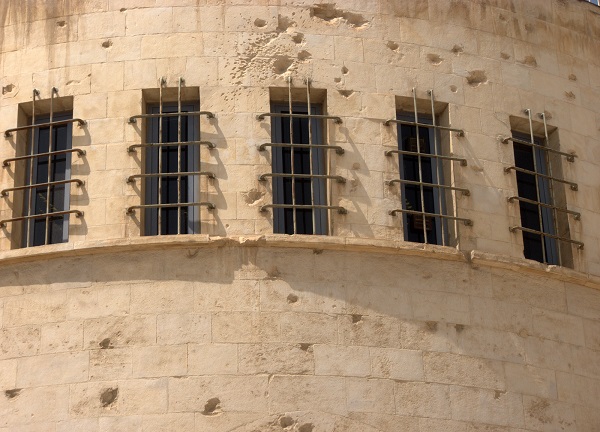
Bullet holes in the wall of the Jerusalem Municipal Building, formerly Barclays Bank. Photo credit: Ze'ev Barkan
Despite the times, Dina and Mendy had a courtship full of romance. Dad wrote beautiful poems to Mom. Mom made weighty scrapbooks that document their early years. They married on January 12, 1941 on a rooftop across from Jerusalem’s Zion Square. Seven months later, in August 1941, they heeded the advice of the U.S. government and left Israel for New York.
Both Dad and Mom had been members of the Young B’nai B’rith Auxiliary Lodge in Jerusalem and were given a letter of introduction to AZA leaders in the United States. Mom also carried a letter of recommendation from a family friend stating that she “is a very clever and efficient woman and a good social worker . . . I am sure that you will find her very useful there, and I know that you will not lose time to initiate her into the life of America and into some good deeds for the benefit of Palestine.” How prophetic these proved to be, for Mom and Dad were lifelong, active supporters of many Jewish and Zionist philanthropic and educational institutions.
Like his father in 1928, Dad wrote his impressions of the young state of Israel in December 1956, following one of many visits:
First was my intense feeling, as I got off the plane, of coming home, of belonging, of being among my own people. Next, was the realization of the foresight and planning of the government... full-grown trees on either side of the highways... the tremendous upsurge of building... and the fine accommodations for tourists... In addition to the sentimental attachments that Israel has for Jews, it is now a place for a real vacation for all tourists.*
-----------------------------
*Muriel Newman, “You Can Quote Me. . .,” Interview with Emanuel Dauber, Passaic-Clifton Jewish Community News, December 28, 1956.
In 1973 Yom Kippur, the holiest day in Judaism, fell on Shabbat. We were stunned as word spread throughout our synagogue that the Arab coalition had launched a surprise attack on Israeli positions. Despite our concerns Mom and Dad were not deterred. They went forward with their long-planned Aliyah that upcoming Tuesday. They felt (as did almost everyone) that this incursion would be like the brief Six-Day War in June 1967. On October 9, 1973, the third day of what would be the nineteen-day-long Yom Kippur War, Mom and Dad boarded their plane “home.”
They arrived in a blackout. They and another couple would be the only ones to make Aliyah that day. They found themselves stranded at the airport, as there were no taxis or public transportation. A good Samaritan gave the two couples a ride to Jerusalem in a car with blacked-out headlights.
For more than ten years, Mendy and Dina lived their dream in Israel, before returning to the United States in 1984 for health reasons. Mendy died June 8, 1985 (19 Sivan, 5745). Dina died ten years later on March 27, 1995 (25 Adar II, 5755). They have both returned “home” to Zion and Jerusalem for their final Aliyah and resting place on the Mount of Olives (Har Hazeitim), Judaism’s oldest and holiest cemetery. As is written on Mom’s gravestone, “Wherever she lived, her home was in Jerusalem.”
Recommended for you:
ISRAEL MEMORY PROJECT
Memories, ancient and modern, create the living story that is Israel. Take a look and, if you’d like, add your own!
About the Author
